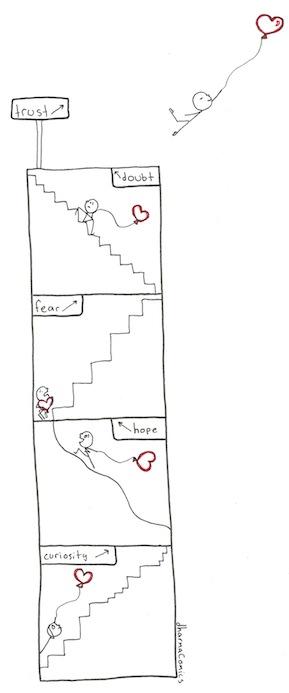Fearlessness can Coexist with Fear

IMAGE OF THE WEEK

In meditation and in mindfulness practice, we are learning to replace fear with trust, not as an ideal or abstraction, but as a sense of self-confidence that arises from coming to know fear well. Many people have a fear of fear, a tremendous aversion to it, and don't allow themselves to enter into it fully. If we simply allow ourselves to fully experience our fear, eventually we learn that we can do so without being overwhelmed by it. Trust develops, not from willing ourselves to trust, but from discovering for ourselves that we can be present for our experience and not overwhelmed by it.
Many of us have been convinced, by our society, by our own experiences in life, and by our own logic, that we cannot trust our own natural state of being. We turn away from ourselves and our experiences. In mindfulness practice we are learning not to destroy or control our feelings, but to discover them and be present with them. We begin to see how they work when we enter fully into them and give them room. We begin to see how we create our emotional lives and reactions.
In this process, we learn to trust awareness and direct presence more and more deeply. As we explore the layers of our fear, our trust expands into wider and wider circles of who we are. The process of awakening can be understood as ever-widening circles of trust. Awakening occurs when trust becomes all-pervasive.
We can learn to trust awareness, to trust being alive, without props, crutches, views or opinions. In the Buddhist tradition, such people are known as dispellers of fear. They give the gift of fearlessness. Fearlessness is not necessarily the absence of fear. It is a positive quality that can exist side by side with fear, overcoming the limitations arising out of fear. Such fearlessness can be a profound gift to the people around us. In developing the capacity to be fearless, we do it not only for ourselves, but for others as well.
-- Gil Fronsdal, in The Issue at Hand
SEED QUESTIONS FOR REFLECTION: What does giving the gift of fearlessness mean to you? How do you understand fear and fearlessness existing side by side? Can you share a personal experience where you felt both fear and fearlessness, side by side?